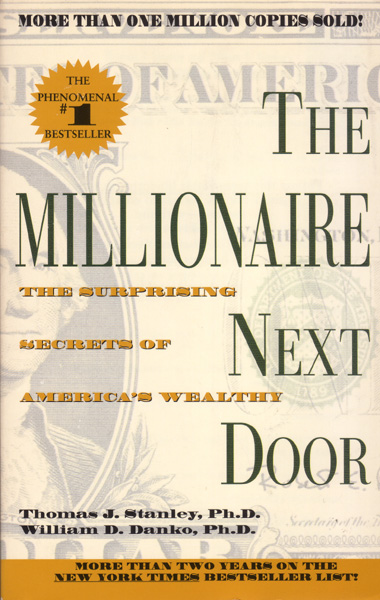The Millionaire Next Door is not a particularly subtle book. Published first in 1996, it draws a thesis based on hundreds of interviews of America’s millionaires, and beats it over the heads of its readers. Repeatedly.
The central, mind-blowing “surprising secret” is that a lot of millionaires have accumulated wealth slowly, and live below their means.
Granted, this book may be suffering from the same problem as A Random Walk Down Wall Street, in that the advice given – that would have been novel at its time – has been repeated so often that it is more cliche than insightful. Some argue that repeating a mantra of “spend less than you earn” is outright unhelpful and needless without further understanding of what actions to take.
In this regard, the caricatures used in the book don’t really help. Even if they’re real folks with real financial problems, their defining characteristics boil down to frivolous consumption, particularly on luxury goods; fancy cars, outsized mortgages and expensive suits are wheeled out as evidence of the lack of financial discipline. Altogether, it paints a picture of an unsustainable, hugely materialistic lifestyle that dooms its practitioners to a lifetime of dependence.
The research shows its age here, as the millennial generation has shown itself to care more about experiences than material goods. To be fair, there is also a level of unsustainability to spending paychecks on seeking thrills, but that doesn’t hit with the same amount of pretentiousness as unnecessary boats and luxury watches. The biggest weakness in this book is in how often – and predictable – it trots out the consumption boogey man only to rain down its repeated catastrophic predictions.
The Millionaire Next Door’s other annoying habit is invoking the millionaire label as little more than a status symbol. Seeing how it spends a lot of time striking down material status symbols, it’s frustrating that the authors don’t see the irony of solely obtaining a high (concentrated around the $1-10 million range) net worth as an end goal. Of course, there are implied benefits around financial security and retirement stability, but so many of its points end up with some variation of the notion that “if they had instead invested that money in x for y years, they’d already be a millionaire!”, as if the only thing that mattered was earning that label. There’s even a section in the book that draws out a fictional conversation between two government tax agents, starts with asking some good questions on the nature of accumulated wealth, only to farcically meander to the idea that the government encourages frivolous spending to goose tax revenues.
Like A Random Walk, I feel like The Millionaire Next Door may be a classic that is an interesting read for academic purposes, but whose advice has not aged as well as I would have hoped.



